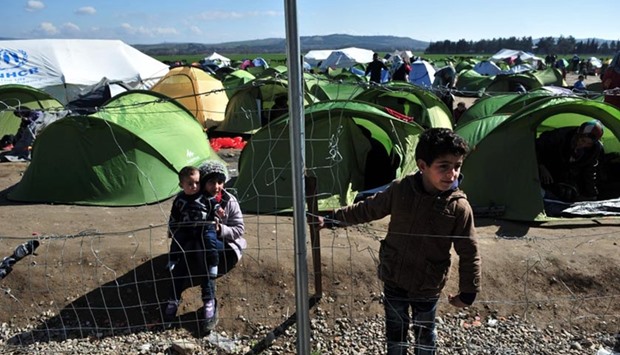Hundreds of migrants and refugees left an accommodation camp in northern Greece on Thursday, preferring to walk to the distant border with Macedonia in a bid to continue their trek to northern Europe, local police said.
Some 400 migrants and refugees walked out of the camp in Diavata, near Thessaloniki, setting out on a march of more than 80 kilometres to the border with Macedonia, which has crimped the number of people it allows through each day.
"They have their backpacks and are moving north," Thessaloniki Mayor Yiannis Boutaris told a local radio station.
"They are mainly youths... they do not want to wait for buses to pick them up... neither the army nor the police can stop them because there is the risk of (violence)," he said.
Officials insisted that Greek camps are guarded by police, but migrants and refugees are free to leave if they so wish.
Another 200 refugees had likewise embarked on a days-long journey of over 300 kilometres to the Idomeni border crossing after setting off from central Greece, a police source in Athens said.
Television footage showed the migrants were being accompanied by riot police and authorities said part of the highway was intermittently closed for their safety, but a senior officer insisted no force would be used to stop them.
'We can't stop them'
"These are people with families in tow, how are we supposed to stop them?" he asked, adding: "They all want to go to Idomeni."
A third group of 100 people set out from the northern Greek city of Kozani for the border, state agency ANA said.
Greek police have been regulating the flow of refugees to the border after Macedonia over the weekend refused to allow transit to Afghans and imposed stricter document controls on Syrians and Iraqis.
But many are desperate to continue their journey northwards and do not wish to wait, even when told that Macedonia may not let them through.
In the summer, many refugees routinely walked some 60 kilometres from the beaches of Lesbos to the Greek island's registration point. For those with small children, the trek could take two days.
A Greek migration ministry source said Skopje had only allowed passage to fewer than 400 people since Wednesday, with another 3,500 waiting at Idomeni.
Greece's police chief on Thursday met with his Macedonian counterpart in Thessaloniki in an attempt to smooth over differences.
They discussed "the establishment of communication channels" between the two departments, the Greek police department said.
With Europe facing its greatest migration challenge since World War II, several states along the trail from Greece to Germany have imposed border restrictions.
Athens now fears that with the flow of arrivals from neighbouring Turkey showing no sign of letting up, it could be left to accommodate and feed scores of thousands of war and poverty exiles.
Another 2,000 people arrived at the port of Piraeus on Thursday from the Greek islands, where additional registration facilities were hurriedly completed only a few days ago.
Greek Prime Minister Alexis Tsipras on Wednesday threatened not to cooperate with future EU agreements on the migrant crisis if the burden was not fairly shared among member states, as he vowed not to let his country become a human "warehouse".
Greece had hoped that a Nato operation to discourage migrant smugglers in Turkey from sending people over would have stemmed the flow.
But the operation was only finalised on Thursday, the alliance said, after delays which Greece attributed to friction between Turkish generals and the government over Ankara's pledge to take back migrants intercepted with Nato's help.

